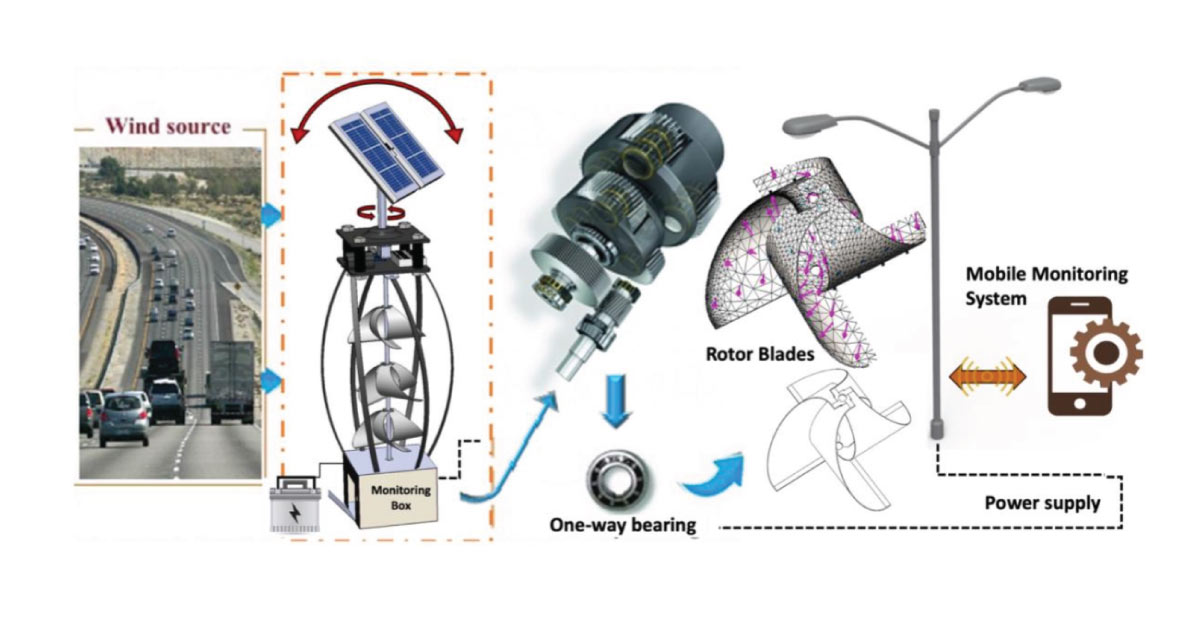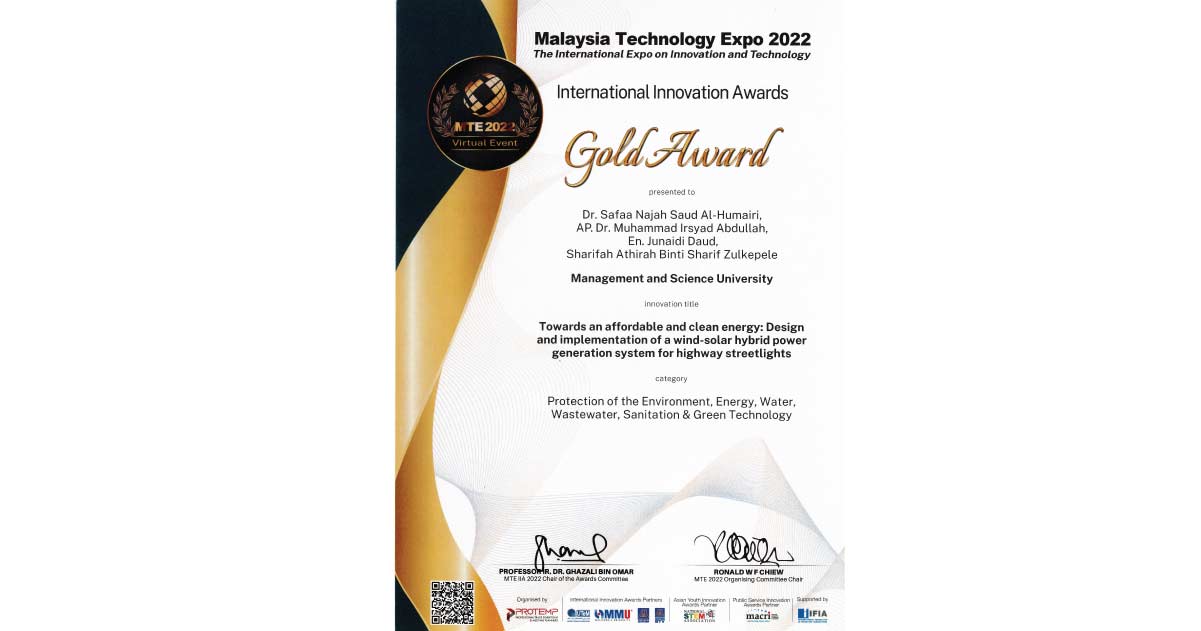

Increased carbon dioxide emission is contributed in a large part by the burning of fossil fuels for energy generation; another being the cutting down of carbon-dioxide-absorbing trees. From energy generation, the largest contributors are streetlights; which have been powered by electricity since 1875, and now number over 300 million in the 21st century.
The operation of an electrical-grid system demands significant human resource and maintenance routine, yet grid-connected streetlights have little backup support when the grid malfunctions or breaks down. Whilst there is also no round-the-clock monitoring system in electricity-powered streetlights, there is limited power generation in streetlights that harness sunlight.
Presenting an SDG-supporting solution is the Wind-Solar Hybrid Power Generation System for Highway Streetlights by Management and Science University (MSU).
Integrated with solar and wind-turbine power generation, the easily installed corrosion/abrasion/aging resistant waterproof system is equipped with not only a mobile and web monitoring system but also GPS navigation and public communication systems. Its smart cut-off circuit and mobile notification fault-reporting make for an easy-care system able to provide clean, affordable energy; with zero pollution both in the city and out on the highway.
The MSU research supporting SDGs 7 for Affordable and Clean Energy, 13 for Climate Action, and 11 for Sustainable Cities and Communities is a project led by Associate Professor Dr Safaa Najah Saud Al-Humairi of MSU’s Faculty of Information Sciences and Engineering (FISE); with team members Associate Professor Dr Muhammad Irsyad Abdullah, Junaidi Daud and Bachelor of Science (Hons) in Mechanical Engineering student Sharifah Athirah Sharif Zulkepele.

It received not only a gold medal in the Protection of the Environment, Energy, Water, Wastewater, Sanitation, and Green Technology sub-category of MTE 2022 but also the Outstanding Innovation Award in the Safety and Security sub-category at the Malaysian Technology Expo (MTE).
Engineering Innovative Solutions, Environmental Sustainability, and Sustainable Energy are among the 25 key research areas at Management and Science University (MSU).
RELATED
Towards a sustainable smart city
RICES gold medal for MSU’s MySolar
Two gold for MSU engineering inventions
Building research skills, methodically
A new future for transformative research
MSU Inspire Research Colloquium (MIRC) 2020
MSU leads RIPHEN into a future of sustainable research
.jpg)
Increased carbon dioxide emission is contributed in a large part by the burning of fossil fuels for energy generation; another being the cutting down of carbon-dioxide-absorbing trees. From energy generation, the largest contributors are streetlights; which have been powered by electricity since 1875, and now number over 300 million in the 21st century.
The operation of an electrical-grid system demands significant human resource and maintenance routine, yet grid-connected streetlights have little backup support when the grid malfunctions or breaks down. Whilst there is also no round-the-clock monitoring system in electricity-powered streetlights, there is limited power generation in streetlights that harness sunlight.
Presenting an SDG-supporting solution is the Wind-Solar Hybrid Power Generation System for Highway Streetlights by Management and Science University (MSU).
Integrated with solar and wind-turbine power generation, the easily installed corrosion/abrasion/aging resistant waterproof system is equipped with not only a mobile and web monitoring system but also GPS navigation and public communication systems. Its smart cut-off circuit and mobile notification fault-reporting make for an easy-care system able to provide clean, affordable energy; with zero pollution both in the city and out on the highway.
The MSU research supporting SDGs 7 for Affordable and Clean Energy, 13 for Climate Action, and 11 for Sustainable Cities and Communities is a project led by Associate Professor Dr Safaa Najah Saud Al-Humairi of MSU’s Faculty of Information Sciences and Engineering (FISE); with team members Associate Professor Dr Muhammad Irsyad Abdullah, Junaidi Daud and Bachelor of Science (Hons) in Mechanical Engineering student Sharifah Athirah Sharif Zulkepele.

It received not only a gold medal in the Protection of the Environment, Energy, Water, Wastewater, Sanitation, and Green Technology sub-category of MTE 2022 but also the Outstanding Innovation Award in the Safety and Security sub-category at the Malaysian Technology Expo (MTE).
Engineering Innovative Solutions, Environmental Sustainability, and Sustainable Energy are among the 25 key research areas at Management and Science University (MSU).
RELATED
Towards a sustainable smart city
RICES gold medal for MSU’s MySolar
Two gold for MSU engineering inventions
Building research skills, methodically
A new future for transformative research
MSU Inspire Research Colloquium (MIRC) 2020
MSU leads RIPHEN into a future of sustainable research
.jpg)